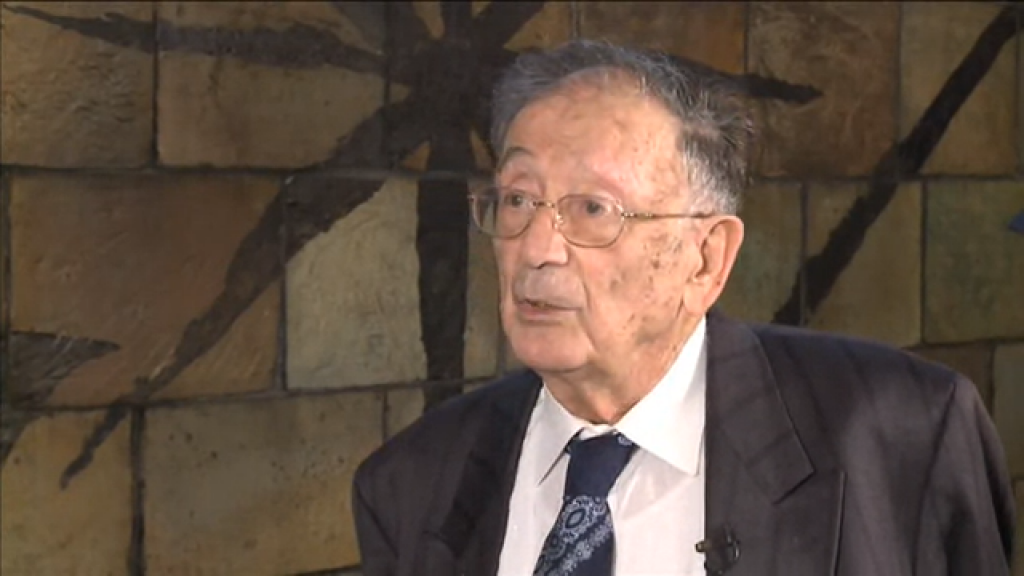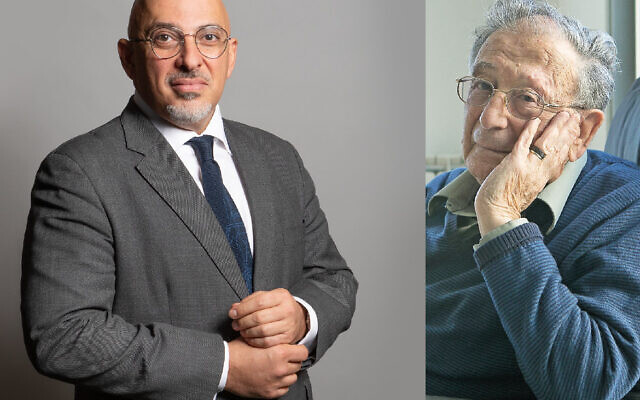Nadhim Zahawi: Universities adopting IHRA is ‘essential, not a box-ticking exercise’
Education Secretary told HET event with Yehuda Bauer that higher education institutions backing the international definition of antisemitism is 'not optional'
Jenni Frazer is a freelance journalist
Education Secretary Nadhim Zahawi has declared that he regards the adoption by universities of the IHRA definition of antisemitism as “essential, not optional. This is not a box-ticking exercise. It’s a vital tool in tackling antisemitism, because it sends a signal that the university takes these issues really seriously. It is a way of nailing your colours to the mast for all to see, telling everyone, students, staff, that antisemitism has no place anywhere… I am not going to ease up until we see everyone fall into line on this”.
Mr Zahawi made his passionate opening remarks at this year’s Lord Merlyn-Rees annual lecture, under the auspices of the Holocaust Educational Trust. More than 700 people worldwide heard him speak in the most personal way of his own experiences before he and his family came to Britain.
Explaining why he often says his visit to Auschwitz last year changed his life, he said: “I know what it feels like to be a young Kurdish boy, terrified by a dictator who has corrupted the state for their own ends. I know what it feels like to be a child in a family that is forced to run away in fear, under cover of darkness; and [that I was forced to leave] rather than go to the same school I had always been to, and grown up with the same friends I’d always had. I know what it feels like when the people you looked to, to safeguard you, turn away from you”.
The Zahawi family were lucky, he said, because they had been able to enter Britain and make a life for themselves. But that was all the more reason, he said, to continue re-telling the lessons of the Holocaust. “The dangers have not passed. Too many of those evils still exist today. I’ve heard first-hand of the abuse Jewish friends have faced in the streets, in restaurants and cafes. We know that Jewish students are victims of antisemitism on campus; and we hear the despicable way that too many people attack the state of Israel and its citizens”.
The Secretary of State nodded to his previous political brief as the man responsible for the vaccination roll-out, when he declared that “education is the only vaccination against antisemitism”, and pledged continued government support for the Jewish community because he did not believe Jews should be fighting antisemitism on its own.
Keynote speaker Professor Yehuda Bauer, one of the world’s leading Holocaust scholars and an architect of the IHRA declaration, went even further in his address. Antisemitism, he said, had had the most profound effect on global non-Jewish society, leading to the deaths of millions in the Second World War, directly because of Hitler’s intentions. Thus, he said, “antisemitism is a non-Jewish problem, and it is in the interests of non-Jewish society to fight the scourge which endangers the very society in which we live”.
Professor Bauer, now 95 and a former director of Holocaust studies at Yad Vashem, had a pugnacious message for non-Jewish society. “Attack antisemitism, don’t defend the Jews. Attack the antisemites on social media, identify them, state where their money comes from… We should not defend the Jews, we should attack the antisemites as the basic answer to the situation”.

He believed that governments which understood the situation were in fact threatened by antisemitism.
Later in his remarks Professor Bauer drew a distinction between Holocaust denial — which he said had been “sent into the shadows” with the victory of Deborah Lipstadt over David Irving — and Holocaust “distortion”, which he said manifested itself today in the wearing of yellow stars by anti-vax campaigners.
The event was chaired by Karen Pollock, chief executive of HET.

Thank you for helping to make Jewish News the leading source of news and opinion for the UK Jewish community. Today we're asking for your invaluable help to continue putting our community first in everything we do.
For as little as £5 a month you can help sustain the vital work we do in celebrating and standing up for Jewish life in Britain.
Jewish News holds our community together and keeps us connected. Like a synagogue, it’s where people turn to feel part of something bigger. It also proudly shows the rest of Britain the vibrancy and rich culture of modern Jewish life.
You can make a quick and easy one-off or monthly contribution of £5, £10, £20 or any other sum you’re comfortable with.
100% of your donation will help us continue celebrating our community, in all its dynamic diversity...
Engaging
Being a community platform means so much more than producing a newspaper and website. One of our proudest roles is media partnering with our invaluable charities to amplify the outstanding work they do to help us all.
Celebrating
There’s no shortage of oys in the world but Jewish News takes every opportunity to celebrate the joys too, through projects like Night of Heroes, 40 Under 40 and other compelling countdowns that make the community kvell with pride.
Pioneering
In the first collaboration between media outlets from different faiths, Jewish News worked with British Muslim TV and Church Times to produce a list of young activists leading the way on interfaith understanding.
Campaigning
Royal Mail issued a stamp honouring Holocaust hero Sir Nicholas Winton after a Jewish News campaign attracted more than 100,000 backers. Jewish Newsalso produces special editions of the paper highlighting pressing issues including mental health and Holocaust remembrance.
Easy access
In an age when news is readily accessible, Jewish News provides high-quality content free online and offline, removing any financial barriers to connecting people.
Voice of our community to wider society
The Jewish News team regularly appears on TV, radio and on the pages of the national press to comment on stories about the Jewish community. Easy access to the paper on the streets of London also means Jewish News provides an invaluable window into the community for the country at large.
We hope you agree all this is worth preserving.






















